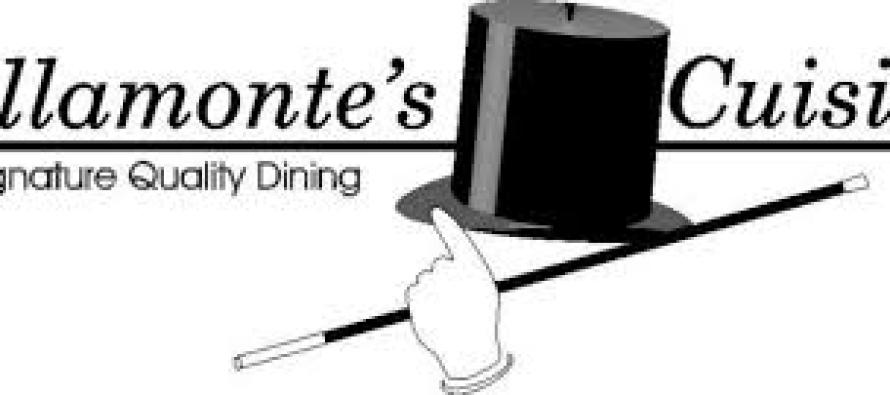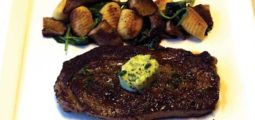20 Questions: Steve Villamonte

MR: Chef, tell us about your family history in culinary arts and how it has influenced your career choices.
SV: I don’t know a lot about my family history if I’m honest. I could (and most likely will at some point) use a social security death index to search for people further back in my family tree as I do find it interesting. What I do know is that my father, Luis Villamonte, was Peruvian born and came to the US to go to med school. He never showed up for classes and was subsequently cut off from the family support. His elder sister came from Peru to bring him home, but he refused and our government then gave him and ultimatum, serve in the US military or be deported. He joined the Navy he served as a cook during his entire term. He then trained at Johnson and Wales and ended up at Gorat’s steak house where they still have the same menu he wrote many years ago. He became the executive chef at Happy Hollow in the sixties and worked several country clubs around the Midwest. I spent my summers playing at the club pools, during the day, and working the kitchens at night.
MR: What has been the most influential experience that has had the greatest impact on your career?
SV: When I was young and growing up so close to the business, I remember the position of a chef not having the respect that is does today. My father always earned a good income and our family lived a suburb life, but he had to always fight for professional respect. Back then cooking for a living was considered second class work. Today you’re a rock star! I found that because of my experience growing up in the kitchen, I was way ahead of everyone else and could jump right into the tenured positions. I immediately started working on my education so I could promote the executive chef position as professional, where education is just as important as hard-knocks.
MR: Have you spent much time outside of Omaha?
SV: I grew up mostly in the Midwest. My father was temperamental so when he was not happy in his position, he would move on. He left his footprint in the way of his Thunderbird salad at many country clubs throughout the Midwest. I had the chance to work in many private clubs and have great insight for a club ambiance today.
MR: What keeps you tied to and living in Omaha?
SV: Omaha is home and always will be. I probably will become a snowbird some day but that does not diminish my love for this city.
MR: In your opinion, what are some of the strong points or negative points in relative to the food scene within the Heartland?
SV: We have too many young people and students wanting immediate gratification. They attend culinary school, watch the food network, and if they are on the ball, they get placed on a pedestal by instructors, family, friends or the media. Without the mentoring of a skilled chef in the real world they do not learn how to survive. Gold medal plate presentations are great but they do not teach you political survival, how to manage people, food and labor cost controls or expeditious line skills. My first G.M. in my first executive chef role said he did not care about my technical skills, he could find 1000 chefs with fantastic technical skills. His number one concern was could I manage people. Today, I have multiple employees that have worked for me for many years. A strong point would be the amount of skilled chefs we do have in Omaha that are ready to mentor the young chefs when they are ready for mentoring.
MR: What do you see happening in the food industry in the next 10 years?
SV: I remember when country club food was the best and you could not get the same quality anywhere else. Today you can get country club quality in many public restaurants but for a price. This same upscale quality will continue to seep into the mainstream restaurant, the price will drop, it will be served faster, and continue to become more casual. Yesterday’s gourmet will be tomorrows quick casual, it already is to a certain degree.
MR: What would you like to say to those aspiring culinary professionals reading out interview?
SV: Make mentoring with a reputable chef an important part of your training, get all the education you can.
MR: What is a niche within the industry that you are waiting to be filled?
SV: I am an entrepreneur, I don’t want to give any ideas that I may someday tap into.
MR: Within the restaurant industry who do you feel will survive the slow economy and family spending cutbacks?
SV: The most skilled restaurateurs are the ones that can adapt to the changes of the economy.
MR: What is the most innovative thing within our industry that you have seen this past year?
SV: Manufacturing and processing technologies. I see foods today that I know are prefabricated, but have all the qualities of scratch preparation.
MR: You reference how the local chapter used to be, could you enlighten us as to what we as a chapter can do to spur interest and involvement.
SV: Back in the 80’s we easily had between 50 and 100 attend each monthly meeting. One of the things I inspired the most when I chartered and was president of the local chapter was competition and professionalism. The mentoring chefs would use their students as the competitors to represent their restaurant or club. We have so many functions today, it is impossible to get everyone to participate. I think the local chapter should sponsor one major competition annually and give all the old school chefs a role in the organization of the event. Then get them all to participate as competitor/mentors. I guarantee success!
MR: How does Villamonte’s Cuisine work to stay on top of trends and desires of the ever evolving customer?
SV: I give the customer what they want, no matter what that is. I custom menu’s, make the price right, I do almost everything from scratch. Even simple menus are done with care.
MR: What can the membership do to assist in the continued growth and activity of the chapter?
SV: Lay down the egos’ reach out to the tenured chefs, create smaller roles, and spread the responsibilities around. This will get the culinary community more involved.
MR: Chef, please tell our readers about the Annual Ron Sailors fund raising dinner?
SV: Ron was a rare chef that got along with everybody. He was a gentlemen and comedian with a lot of respect for his mentors. He progressed faster than anyone I have seen in this business. He did it the right way and it paid off. He developed friendships that to this day donate there time and talents for this annual event. I personally think it is one of Omaha’s finest food events and the best part is almost all the proceeds go to culinary student scholarships.
MR: What would you like to share with our readers about how they can be involved in the most enjoyable event?
SV: If we get more chefs involved we would have to move the event because we are maxing out the Press Club. I think this would be the perfect chapter hosted event to get all the old school chefs to host a station. The guest could vote on their favorites. All for a good cause!
MR: Please share with us a personal goal to accomplish in the next 5-10 years?
SV: I have always dreamed of getting my Jurist Doctorate. Time seems to always be the issue. I will continue my education regardless. I would like my trademarked Thunderbird Salad to become a household staple and to continue growing beyond our local boarders.
MR: What is a day off to you?
SV: Time away from my everyday work, time with my beautiful wife and children.
MR: Who do you look-up to or admire?
SV: Any chef who continues to grow and learn no matter what age. Lionel Have’, Tom Shaw, Mike Flannigan. Anyone who gives to our profession because of passion for what they do. Someone who demonstrates integrity no matter what position they hold. This person will never have to look back with regret!
MR: What is your favorite food?
SV: Thunderbird Salad!
MR: What is your favorite place to dine in the Heartland area?
SV: Home!

Brian O'Malley
Brian O'Malley is a chef instructor at Metropolitan Community College's Institute for the Culinary Arts. A graduate from New England Culinary Institute and a member of the American Culinary Federation, O'Malley worked as the chef/owner of Spread. He was a manager/instructor at the New England Culinary Institute, head chef at Vanilia in Santorini, Greece, and BackNine Grille, assistant food and beverage manager at the Champion's Club and opening chef at BOJO. Brian O'Malley can usually be found in MCC's kitchens, teaching, creating works of culinary genius or debating the perils of out of season tomatoes.
No comments
Write a commentOnly registered users can comment.











